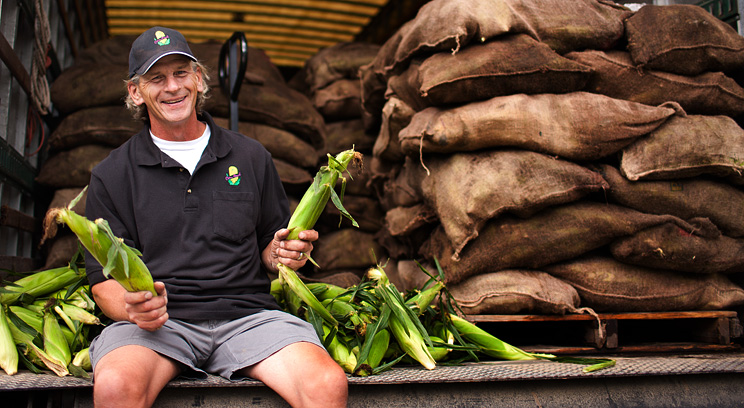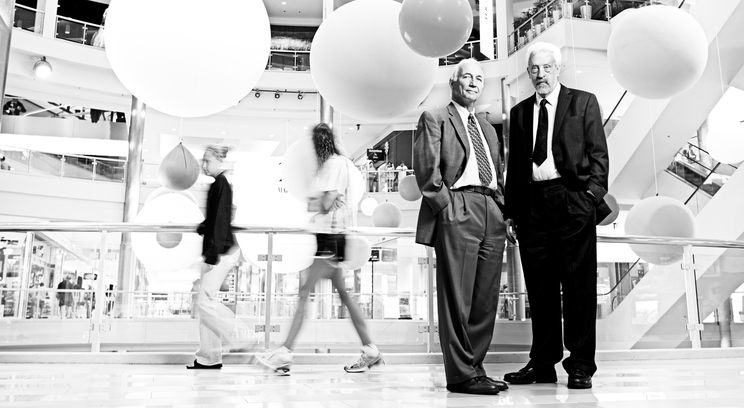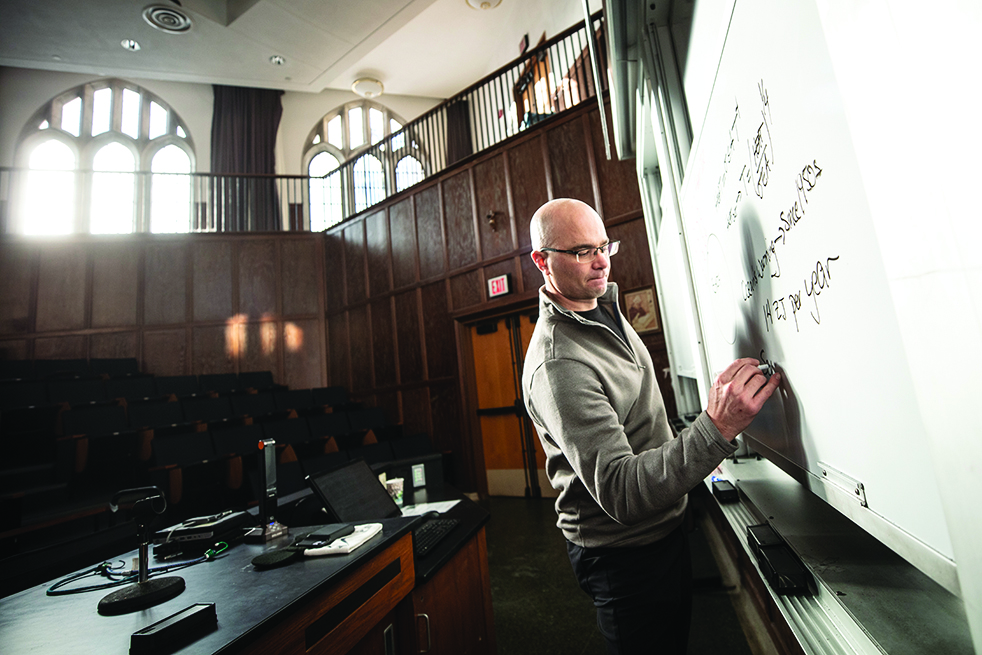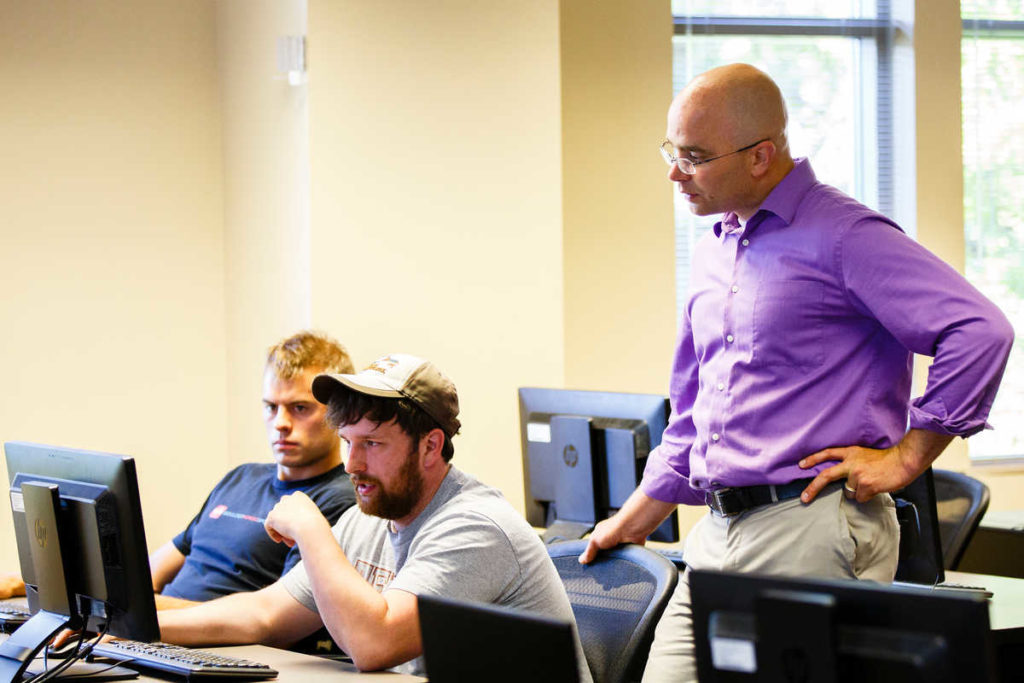More than 2.8 billion pounds of fresh market sweet corn were harvested in the United States in 2011, a staggering number that does not account for sweet corn grown and harvested in backyards or community gardens. And the No. 1 sweet corn producer in the United States, according to the U.S. Department of Agriculture, is Minnesota – accounting for more than 25 percent of Minnesota agriculture yearly.
One could argue that a major individual contributor to those statistics is Brad Ribar ’82 M.B.A., founder, owner and chief roaster at the Minnesota State Fair roasted corn stand, where he and a crew of 90 to 100 employees roast and sell about 200,000 pounds of sweet corn in just 12 days.
The Best Job of the Summer
For many regular fairgoers, a stop at the corn roast stand is a must. But when it first appeared 28 years ago, it was a slightly harder sell. "We gave away a lot of free samples the first year. People had never seen roasted corn before. Also, when we first started, no one wanted burnt kernels. Now, they ask for them," Ribar says.
Ribar got the idea for a corn stand at the Minnesota State Fair while visiting his uncle in Wisconsin. At that state’s annual get-together, he sampled the Lion’s Club roasted corn. He was so taken by it, he asked to vol-unteer at the booth for the duration of his stay. While there, he says, "I asked a hundred questions and, when I left, I knew what I wanted to do."
While he may have been certain of his success, Minnesota fair officials were not. It took five years of lobbying for them to accept his application – three years to approve the idea and two additional years to find the right location.
"To get space at the fair, you have to apply. A committee reviews your experience and your equipment, as well as their needs. It’s almost as though they are preparing a meal in one area; they want to ensure the stands represent a full meal and not too much of one thing." One thing working in Ribar’s favor was his business plan, a plan he had drafted and honed while a student in the Evening UST MBA program.
The program’s strength in entrepreneurship was one factor in his decision, and he discovered that his classmates’ strengths were just as important. "My classmates were people who ran their own businesses and were, like me, interested in understanding all they needed to know about that. My professors were also business owners, or people working in corporate America, so I learned a lot I wouldn’t have otherwise learned on my own. That was important to me," he says.
State Fair Love Affair
Ribar grew up at the Minnesota State Fair, where his grandparents ran the sanitation business for 68 years. "I love the fair. There’s something special about it I’ve never felt at other state fairs or county fairs. When you walk in, you have a sense of excitement, even when no one else is there," he says.
Working for his family in both the sanitation business as well as the wholesale Christmas wreath business his grandparents left to them when he was in the ninth grade, Ribar discovered at an early age that he never wanted to work for anyone else. While completing his undergraduate business degree at the University of Wisconsin-River Falls, Ribar found summer employment with a landscaper and a plumber, experiences that further cemented his entrepreneurial aims. "Working for a plumber, I learned a lot about mechanics that are beneficial now. But with the landscaper, I learned that it took them three days of selling to get two days of work. I knew that wasn’t something I ever wanted to do."
Since inheriting the wreath business, Ribar has gone on to found and operate three different businesses: Ribco Enterprises, owned jointly with his wife, is the name under which the corn roast operates; Brad & Harry’s, a partnership with a college friend that operates cheese curd stands at other state and county fairs; and Lorette Foods, another cheese curd operation he owns with his mother- and father-in-law. But the roast corn stand was the first and is clearly, listening to Ribar talk, the one about which he is most passionate.
Love What You Do
An early and disciplined saver, Ribar graduated from college with a substantial nest egg, one he used to start Ribco Enterprises.
In the first year, Ribar employed 24 people, though he admits they would have needed only half that number. At this year’s fair, 55 to 60 part-time employees were on hand at any one time to staff the business. Employees are recruited solely by word-of-mouth. "We began by talking to people in my church’s youth group and their friends. Each year, some would return, or their friends would apply. We have some people working with us today who have been with us since day one," he says.
While his employees come from many different backgrounds – from college students to financial advisers – they share Ribar’s ethos: "Love what you do; believe in it. Don’t be afraid to work or get dirty, and be willing and ready to have fun."
For young entrepreneurs, Ribar has additional advice: "Don’t get discouraged – give anything three years. It takes that long to know if you’ve got a shot or not. I’ve seen many people quit after two years when they were close to making it happen."
Ribar is the first to admit that the success of the corn stand is due to a lot of luck and good help. "When we first opened, our biggest issues were the mechanics. We designed the roast-ing racks ourselves. … It was a bad design." The first time they tested the racks – the night before the fair opened in 1984 – they flipped the corn across the booth. "Luckily, I have an uncle who is a welder, and we ran to his garage. We cut them apart and re- welded them and are still using them today."
Another contributing factor to his success was finding a farmer who can grow sweet corn in the quantities Ribar requires. In the early years, he bought from a variety of farmers. But today, he works with just one. "He grows a special seed just for us. It’s an expensive seed that many farmers don’t like to grow because the yield is low and the corn doesn’t last as long in the stores as some others do. But it’s perfect for us," Ribar says.
It helps the roast corn stand consistently makes the list of top 10 food sellers at the Minnesota State Fair each year. The corn is a "supersweet" hybrid variety that holds more sugar in each kernel. Sweet corn itself is a genetic mutation of field corn that dates back to the 1700s, when it was purportedly first grown in Pennsylvania.
"Really good corn and roasting make all the difference," Ribar notes. "Roasting gives the corn a different flavor. It’s richer and deeper. If you roast it for 25 to 30 minutes, the sugar in the corn caramelizes."
When asked how he landed upon the ideal roasting time, Ribar smiles: "We cooked it for an hour."
Corn Futures
Twelve years ago, Ribar and his brother sold the wreath business they had inherited. "I had three kids at home, worked all summer, and the wreath and fair business overlapped. I never saw my children … and they were why I was working so hard. I couldn’t see the point in that," he says.
That was the day when, in Ribar’s estimation, he retired. Since then, he has been a man of "leisure," or at least leisure in his eyes. Between his various enterprises, he and his team travel to 40 events each summer. In the off season, they attend trade shows and conferences to learn of innovations in the field and talk with others in their line of business. And he ice fishes. But it’s the corn business that he loves, and that occupies most of his time and passion. He hopes that his son and daughter will take over some day, but when asked what is standing in their way, Ribar smiles again: "The old man."
Read more from B. Magazine.







